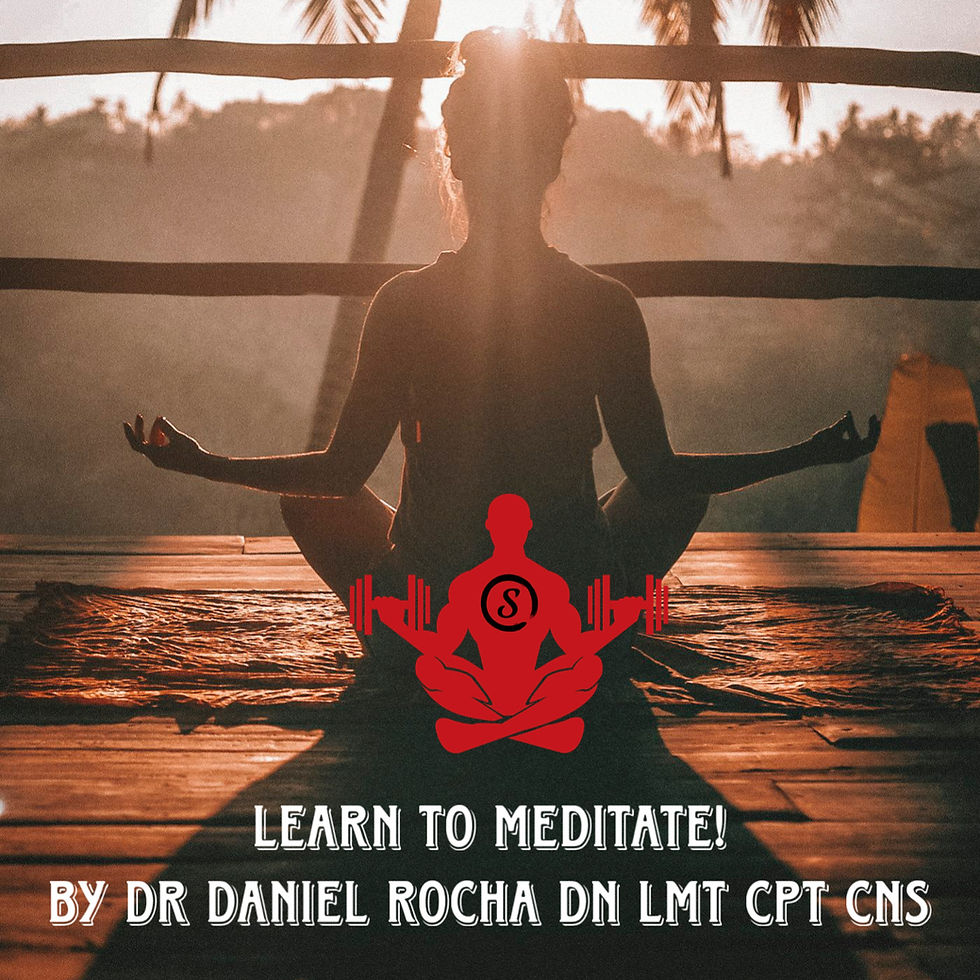Learn to Meditate
- drocbody
- Jul 17, 2025
- 3 min read

Learn to Meditate
By Dr Daniel Rocha, DN LMT CPT, CNS
Meditation is a practice that activates the parasympathetic nervous system (PSNS) by distracting one from struggles. Meditating daily is one of the most powerful ways to work with the PSNS. Anger begins with perceiving a threat, working with the mind to alter perceptions, and activating a fight-or-flight response. The feeling of a threat can cause you to overreact to situations, flooding your body with adrenaline. Daily meditation can help an individual by learning to reframe from reacting to every stressful experience, allowing an individual to reflect on what is happening and respond peacefully or walk away. Walking away will always diffuse a situation.
Introduction: The meditation guide will begin with an introduction that will help you relax and prepare your mind for meditation. This may involve breathing exercises, body scans, or other relaxation techniques.
Visualization: Once you are relaxed, the meditation guide will lead you through a visualization exercise that is designed to help you connect with your subconscious mind. This visualization may involve imagining a peaceful and serene environment, such as a beach or forest, where you feel safe and comfortable.
Affirmations: The meditation guide will then introduce positive affirmations that are designed to reprogram your subconscious mind for success and abundance. These affirmations may focus on specific goals, such as financial abundance or career success, and may be repeated multiple times to reinforce their message.
Deepening: After the affirmations, the meditation guide will lead you into a deeper state of meditation, where you can fully absorb the positive messages and energy of the meditation.
Conclusion: The meditation guide will then gradually bring you out of the meditation, allowing you to return to a state of wakefulness and alertness.
How to begin a meditation practice
Before you begin: First, meditate daily by putting it in your daily routine. Please set a time, place, and duration; remember, it does not have to be lengthy. Most will want you to sit still and allow the body to rest, but when I first started, my mind would wander, and I would get restless. I have found that doing movements like yoga while listening to or watching a meditation session allows my body to relax. My muscles are lengthened, and my breathing improves due to light exercise. I would do Cognitive Behavioral Therapy sessions on an app called Bloom, which helped me relax. Openness is an essential ingredient in every meditation. Consciously releasing body tension will allow you to handle whatever arises during meditation.
Meditation helps one understand mental habits by allowing one to observe situations from a neutral vantage point. Constant practice of meditation offers a way to manage anger, calm anxiety, improve breathing, and allow you to be open to certain new methods that work for you.
When you are first learning to meditate, your mind will be hard to control. This is why I encourage movement while you’re learning. The goal is to gently and repeatedly relax your body, thoughts, and emotions. The ability to distinguish between your inner observer and the chaos in your mind means you are learning to respond with a reasonable and rational mindset.
The more one practices meditation, the more it allows one to discriminate between what is real and what is not, between what is life-threatening and a habitual overreaction. Meditation will enable you to see everything that triggers your sympathetic nervous system, and you can begin to make different choices. Remember that no response is a response.
I have learned now to adopt the Jose Silva Method and with NLP programming, which has transformed my life. But we all start someplace, and these baby steps can get you on the right path. Next week, I will introduce what the Jose Silva Method is and the step-by-step process to begin.
Behan, C. (2020, December). The benefits of meditation and mindfulness practices during times of crisis, such as COVID-19. Irish Journal of Psychological Medicine. Retrieved September 26, 2021, from https://www.ncbi.nlm.nih.gov/pmc/articles/PMC7287297/.



Comments